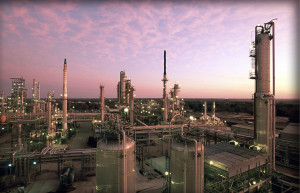The Wall Street Journal reported over the Labor Day weekend that ExxonMobil said it is working toward restarting its Houston-area Baytown refinery, the nation’s second-largest oil refinery, after a shutdown due to Tropical Storm Harvey, but said another of its coastal Texas refineries remains closed.
Exxon’s two processing plants were among nearly a dozen refineries forced to halt operations due to Harvey, which wreaked havoc on three of the U.S.’s main refining hubs along the Texas coastline—Corpus Christi, Houston and the Port Arthur/Beaumont region. The closures have taken around 20% of U.S. refining capacity offline and have caused gasoline prices to soar, both at the wholesale and retail levels, amid concerns many of the refineries may be damaged and stay shut for weeks.
”Our initial assessment of Exxon Mobil’s Baytown complex revealed the need for only minor repairs,” the company said in a statement late September 2. “We are making good progress on restart activities.” From the assessment, it was noted that the specific timing for returning to normal operations at the 560,000 bpd Baytown plant will depend largely on the availability and condition of transportation infrastructure. “We are working with the Port of Houston to expedite vessels through the Houston Ship Channel and we are coordinating with railroads to help facilitate necessary repairs,” it said.
As for Exxon’s other Texas-coast refinery, its 362,000-bpd Beaumont plant east of Houston, it said “units at the Beaumont refinery remain shut down,” without providing further details. The announcements by ExxonMobil follow in the wake of Phillips 66 saying it is hoping to re-start its 247,000-bpd Sweeny refinery, located in Old Ocean near Houston. “We are currently assessing the condition of our impacted facilities and making repairs and other preparations to begin the process of resuming operations,” it said on September 2. Also, four of the main refineries in the Corpus Christi region, plants owned by Valero Corp, Citgo and Flint Hills Resources, have also announced restart efforts.
The nation’s largest refinery, the 603,000 bpd Saudi Arabian Oil Co’s Motiva Port Arthur facility, remains shut and the company’s most recent statement last week said it has no timeline for a restart. But it noted “unprecedented flooding” in the city of Port Arthur, where the refinery is located, 90 miles east of Houston. Many of the 118 U.S. refineries are located along the Gulf Coast and are exposed to Hurricane and tropical storm related flooding, surges, wind, etc. As one spokesman was commenting on these bespoke developments affecting transportation fuel networks, “when these Gulf Coast refineries catch a cold, the U.S. catches the flu.”








Leave a Reply
You must be logged in to post a comment.